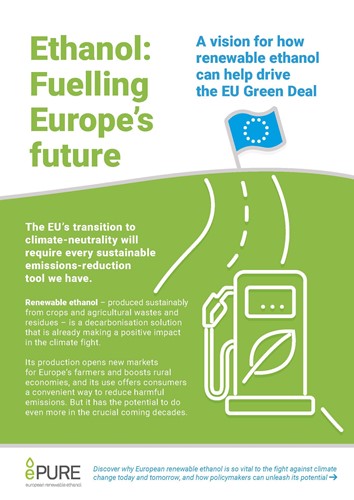News
Fuelling Europe’s future: A vision for how renewable ethanol can help drive the EU Green Deal
19.06.2020
The EU’s transition to climate-neutrality will require every sustainable emissions-reduction tool we have. Renewable ethanol – produced sustainably from crops and agricultural wastes and residues – is a decarbonisation solution that is already making a positive impact in the climate fight.
Renewable ethanol production opens new markets for Europe’s farmers and boosts rural economies, and its use offers consumers a convenient way to reduce harmful emissions.
But it has the potential to do even more in the crucial coming decades.
EU ethanol is…
...more than just a fuel
- Innovative biorefineries process European agricultural feedstock (crops, wastes, residues) into renewable fuel that reduces greenhouse gas emissions from road transport; high-protein, GMO-free animal feed that reduces the need for imported soybean meal; and captured CO2 for use in beverage and food applications.
- These refineries are part of a circular economy that makes the most effective use of land and waste materials and reduces reliance on fossil fuel.
…a European solution
- Ethanol production is an important source of income for Europe’s farmers, and it boosts rural economies.
- Promoting its production and use offsets need for imports of crude oil and animal feed and conforms to EU sustainability ideals.
- Renewable ethanol is a vital part of Europe’s growing bio-based economy, reducing our dependence on fossil fuels.
…today’s best CO2 abatement option… and tomorrow’s, too
- ePURE members' ethanol reduces GHG emissions from today’s vehicles – more than 72% on average compared to fossil petrol. E10 works in nearly all petrol cars currently on the road.
- A wider uptake of E10 requires no changes to existing transport infrastructure and is a convenient, user-friendly way that consumers can made an immediate impact in the fight against climate change.
- But ethanol can make an even bigger impact in the future, as its greenhouse gas reduction ability keeps improving. With more countries adopting E10 ethanol blend as a standard petrol grade, and with some countries looking at even higher blends of ethanol, we can achieve even greater emissions-reduction results.
- Even as the market share of electric vehicles increases, petrol cars and hybrids will remain predominant on Europe's roads for decades. Low-carbon liquid fuels such as renewable ethanol are a proven, cost-effective way to decarbonise them.
Find out more about how renewable ethanol can drive the EU Green Deal in the short-, medium- and long term by downloading the full infographic here.
